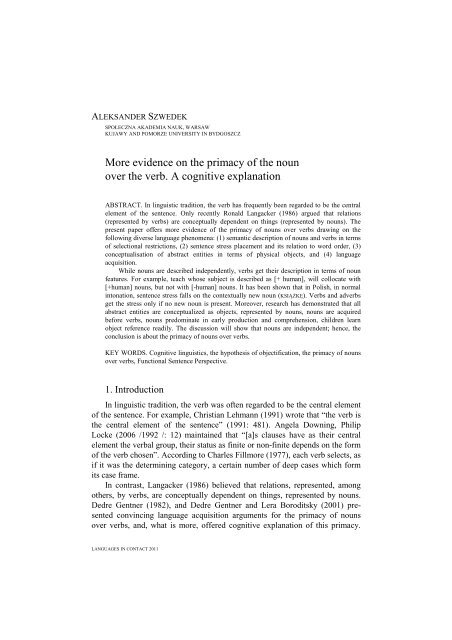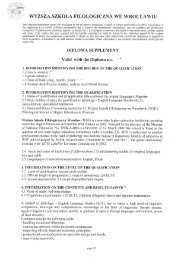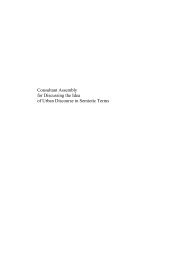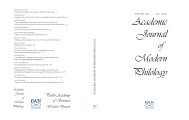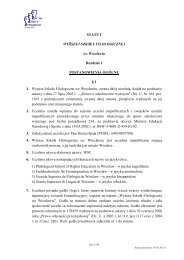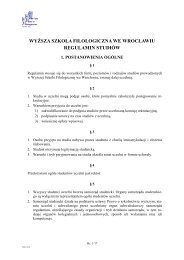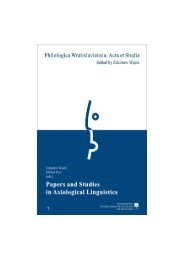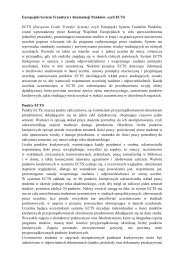s - Wyższa SzkoÅa Filologiczna we WrocÅawiu
s - Wyższa SzkoÅa Filologiczna we WrocÅawiu
s - Wyższa SzkoÅa Filologiczna we WrocÅawiu
You also want an ePaper? Increase the reach of your titles
YUMPU automatically turns print PDFs into web optimized ePapers that Google loves.
ALEKSANDER SZWEDEK<br />
SPOŁECZNA AKADEMIA NAUK, WARSAW<br />
KUJAWY AND POMORZE UNIVERSITY IN BYDGOSZCZ<br />
More evidence on the primacy of the noun<br />
over the verb. A cognitive explanation<br />
ABSTRACT. In linguistic tradition, the verb has frequently been regarded to be the central<br />
element of the sentence. Only recently Ronald Langacker (1986) argued that relations<br />
(represented by verbs) are conceptually dependent on things (represented by nouns). The<br />
present paper offers more evidence of the primacy of nouns over verbs drawing on the<br />
following diverse language phenomena: (1) semantic description of nouns and verbs in terms<br />
of selectional restrictions, (2) sentence stress placement and its relation to word order, (3)<br />
conceptualisation of abstract entities in terms of physical objects, and (4) language<br />
acquisition.<br />
While nouns are described independently, verbs get their description in terms of noun<br />
features. For example, teach whose subject is described as [+ human], will collocate with<br />
[+human] nouns, but not with [-human] nouns. It has been shown that in Polish, in normal<br />
intonation, sentence stress falls on the contextually new noun (KSIĄŻKĘ). Verbs and adverbs<br />
get the stress only if no new noun is present. Moreover, research has demonstrated that all<br />
abstract entities are conceptualized as objects, represented by nouns, nouns are acquired<br />
before verbs, nouns predominate in early production and comprehension, children learn<br />
object reference readily. The discussion will show that nouns are independent; hence, the<br />
conclusion is about the primacy of nouns over verbs.<br />
KEY WORDS. Cognitive linguistics, the hypothesis of objectification, the primacy of nouns<br />
over verbs, Functional Sentence Perspective.<br />
1. Introduction<br />
In linguistic tradition, the verb was often regarded to be the central element<br />
of the sentence. For example, Christian Lehmann (1991) wrote that “the verb is<br />
the central element of the sentence” (1991: 481). Angela Downing, Philip<br />
Locke (2006 /1992 /: 12) maintained that “[a]s clauses have as their central<br />
element the verbal group, their status as finite or non-finite depends on the form<br />
of the verb chosen”. According to Charles Fillmore (1977), each verb selects, as<br />
if it was the determining category, a certain number of deep cases which form<br />
its case frame.<br />
In contrast, Langacker (1986) believed that relations, represented, among<br />
others, by verbs, are conceptually dependent on things, represented by nouns.<br />
Dedre Gentner (1982), and Dedre Gentner and Lera Boroditsky (2001) presented<br />
convincing language acquisition arguments for the primacy of nouns<br />
over verbs, and, what is more, offered cognitive explanation of this primacy.<br />
LANGUAGES IN CONTACT 2011


